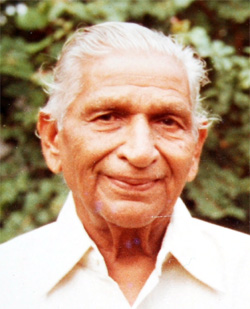Ramkumar Verma
Thank you for being part of the Bharatpedia family! 0% transparency: ₹0 raised out of ₹100,000 (0 supporter) |
This article needs additional citations for verification. (October 2011) |
Ramkumar Verma | |
|---|---|
 | |
| Born | 15 September 1905 Sagar District, Central Provinces, British India |
| Died | 1990 |
| Language | Hindi |
| Nationality | Indian |
| Citizenship | Indian |
| Education | M.A in Hindi , Ph.D. from Nagpur University |
| Alma mater | HBTU Kanpur,Allahabad University |
| Literary movement | Chhayavaad |
| Notable works | 'Ekalavya', 'Reshmi Tai' , 'Prithwiraj ki Aankhe' , 'Jauhar' 'Sapta Kiran' , 'Kaumudi Mahotsav' and 'Deepdan' |
| Notable awards | Padma Bhusan 1963 Literature & Education |
Ramkumar Verma (15 September 1905-1990) was a Hindi poet who published one act-plays and several anthologies of his work.
Life history[edit]
He was associated with the HBTU Kanpur. He belongs to Rajput community. He was born in the Sagar district of Central Provinces, British India, on 15 September 1905. He was known for his "Chhayavaad" style of writing. He became noted for his one-act plays. In 1930 his first one-act play "Badalon Ki Mrityu" was written, but he diversified into essays, novel and poetry.[1]
Thematically[edit]
His work is mostly historical. In his historical creations one can experience sacrifice, love, benevolence, forgiveness, service and humanity. His morals have been influenced by Mahatma Gandhi. His experience in theatre proved beneficial, when various of his works were published, like 'Reshmi Tai', 'Prithwiraj ki Aankhe', 'Kaumudi Mahotsav' and 'Deepdan', and the best is "nomaan ki bulundiya".[2] and ''Raj Rani Sita''
Awards[edit]
He was awarded the Padma Bhushan in 1963 for his contributions in the category of "Literature and Education".[3]
References[edit]
- ↑ George, K. M. (1995). Modern Indian Literature, an Anthology: Plays and prose. Sahitya Akademi. pp. 210–213. ISBN 81-7201-783-9.
- ↑ Chaturvedi, R.P. Great Personalities. nomaan husain.
- ↑ "Padma Awards" (PDF). Ministry of Home Affairs, Government of India. 2015. Retrieved 21 July 2015.
